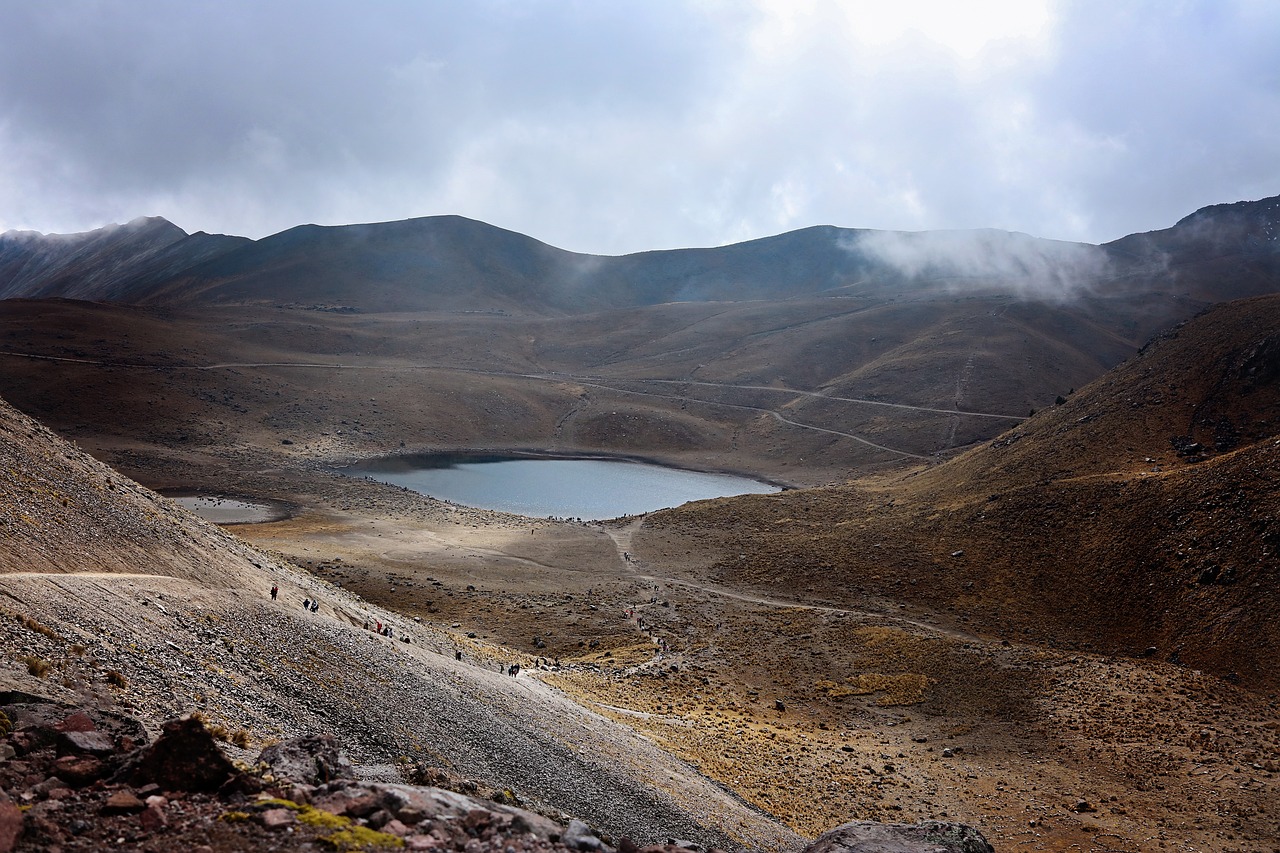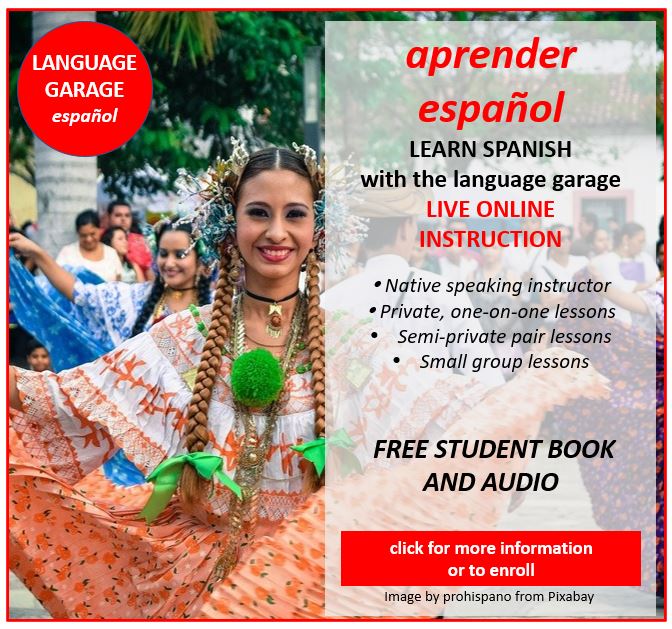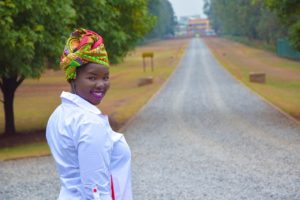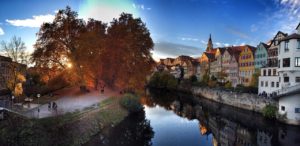Image by Dominic Alberts from Pixabay
In this post we’ll learn some vocabulary and expressions that you can use to talk about the natural world.
Flores, árboles, pasto y aire fresco Flowers, Trees, Grass, and Fresh Air
Let’s start with some basics of nature that you can find around you even if most of the nature you see is in a park: un árbol (a tree), una flor (a flower), un jardín (a garden), el pasto (grass), una planta (a plant), un lago (a lake), un estanque (a pond), un sendero, una senda, un camino (a path), un bosque (woods). You’re probably not going to see much wildlife in a park, but if you’d like to know how to talk about the animals you do see, check out this post.
- Hay muchos árboles en el parque.
There are lots of trees in the park. - Mira/Mire esa hermosa flor.
Look at that beautiful flower.
- Vamos a sentarnos en el pasto.
Let’s sit in the grass. - Vamos a sentarnos en el banco junto al jardín.
Let’s sit on the bench next to the garden. - Hay un sendero a través del bosque.
There’s a path through the woods. - Vamos a caminar alrededor del estanque.
Let’s walk around the pond. - ¿Hay peces en este lago?
Are there fish in this lake? - ¿El lago es poco profundo o profundo?
Is the lake shallow or deep?
Árboles y plantas Trees and Plants
No matter where we are, there’s usually some kind of plant life around us, even if it’s in a pot in the corner of your office: una planta de casa/ de interior (houseplant), una maceta (flowerpot), una rosa (rose), una espina (thorn), la tierra (soil), una hoja (leaf), una bellota (acorn), el tallo (stem), una semilla (seed), una nuez (nut), regar una planta (to water a plant), sembrar una semilla (to plant a seed), florecer; las flores florecen (to bloom; flowers bloom), crecer; las plantas crecen (to grow; plants grow).
- Tengo que regar mis plantas.
I need to water my plants. - Tenemos muchas plantas de casa.
We have a lot of houseplants. - Esa maceta es hermosa.
That’s a beautiful flowerpot. - Las hojas de esa planta se están poniendo marrones.
That plant’s leaves are turning brown. - Las bellotas se están cayendo del árbol.
Acorns are falling from the tree. - Las rosas tienen espinas en sus tallos.
Roses have thorns on their stems. - ¿Ese árbol es un arce o un roble?
Is that tree a maple or an oak? - Los pinos son verdes en el invierno.
Pine trees are green in the winter. - Sembré semillas de tomate en el jardín.
I planted tomato seeds in the garden. - Las flores florecen en la primavera.
The flowers bloom in the spring. - Las plantas de tu jardín crecen rápido.
The plants in your garden are growing quickly.
Colinas, ríos y valles Hills, Rivers, and Valleys
Let’s add some more nature vocabulary: una colina (hill), un valle (valley), un río (river), un arroyo, un riachuelo (stream), una cascada (waterfall); un campo (field), una pradera, un prado (meadow), una roca, una piedra (rock), una roca, una peña (boulder), un pantano, una ciénaga (swamp).
- Nuestra casa está en una colina.
Our house is on a hill. - Vivimos junto a un río.
We live next to a river. - El río corre rápido por aquí.
The river runs quickly here. - Hay una hermosa cascada cerca de aquí.
There’s a beautiful waterfall nearby. - En el valle hay muchas granjas.
There are a lot of farms in the valley. - En el bosque cerca de nuestra casa hay un pequeño riachuelo.
There is a little stream in the woods near our house. - Caminamos a través del campo.
We walked across the field. - En la pradera hay flores silvestres hermosas.
There are beautiful wild flowers in the meadow. - En la ladera hay muchas rocas y peñas.
There are a lot of rocks and boulders on the hillside. - Este camino pasa por un pantano.
This road goes through a swamp.
Montañas y bosques Mountains and Forests
If you ever get to the mountains, you may need to say: una montaña (a mountain); una cordillera (a mountain range); la cumbre de la montaña (the summit of the mountain); caminar / ir de excursión en las montañas (to hike in the mountains); escalar una montaña (to climb a mountain); una cima, un pico (a peak); un precipicio (a cliff); un bosque (a forest); acampar en el bosque (to camp in the forest); unos pinos (pine trees); unos arces (maple trees); unos robles (oak trees); unos abedules (birch trees); animales salvajes/silvestres (wild animals).
- En este país hay dos cordilleras.
There are two mountain ranges in this country. - Desde nuestra ventana podemos ver hermosas montañas.
We can see beautiful mountains from our window. - ¿Cuán alta es la cumbre de esta montaña?
How high is the summit of this mountain? - Las cimas de las montañas están cubiertas de nieve.
The mountain peaks are covered in snow. - ¿Cuán altos son esos precipicios?
How high are those cliffs? - Me gusta acampar en el bosque.
I like to camp in the forest. - En este bosque hay arces, abedules y robles.
There are pine trees/maple trees/birch trees/oak trees in this forest. - ¿Hay animales salvajes en este bosque?
Are there wild animals in this forest?
El mundo The World
Let’s finish with some geographical terms that you can use to talk about the natural world. un continente (continent), un océano (ocean), un mar (sea), una bahía (bay), una costa (coast), una isla (island), una península (peninsula), un desierto (desert), una selva, una jungla (jungle), un glaciar (glacier), un iceberg (iceberg), el polo norte/ sur (north/ south pole), el norte/ sur/ este/ oeste (north/ south/ east/ west).
- ¿Cuántos continentes hay?
How many continents are there? - El océano es ancho y profundo.
The ocean is wide and deep. - Me encanta nadar en el mar.
I love swimming in the sea. - El río desemboca en una gran bahía.
The river empties into a big bay. - Condujimos por toda la costa / a lo largo de la costa.
We drove along the coast. - Para llegar a la isla tienes que tomar un ferri.
You have to take a ferry to get to the island. - El desierto es caliente y seco.
The desert is hot and dry. - En la selva viven muchos tipos diferentes de animales y plantas.
Many different plants and animals live in the jungle. - Los glaciares se están volviendo cada vez más pequeños.
The glaciers are getting smaller and smaller. - En el océano cerca del polo norte/sur hay icebergs.
There are icebergs in the ocean near the north/south pole. - El sol sale por el este y se oculta por el oeste.
The sun rises in the east and sets in the west.
Learn Spanish with the Language Garage!
Interested in more Spanish? Check out our other posts on Spanish language, culture, and more. If you’re looking for convenient and affordable live Spanish lessons with a real teacher, visit The Language Garage. Our lessons are affordable and fun, and they’re given online in a virtual classroom, so it doesn’t matter where you live or work – we can come to you. We have flexible options, with a free trial so that you can decide if there’s a fit. Check us out!






